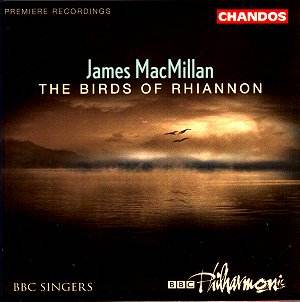In his accompanying booklet notes to this disc Stephen
Johnson asserts that polystylism and eclecticism are the new accepted
face of contemporary music in the early twenty first century, creating
a stylistic synthesis that would have been looked upon as derisory in
many circles as recently as ten to fifteen years ago.
When applied to the music of James MacMillan one can
quickly ascertain that his compositional language can indeed draw its
influences from a wide range of sources, yet it is the gifted few that
are able to assimilate and distil these influences in the way that MacMillan
succeeds in doing, the fact that he speaks with an individual yet startlingly
wide-ranging voice being borne out admirably by the music on this disc.
The familiar characteristics of MacMillan’s music are
here without a doubt, the rhythmically dancing brass figures at around
1’20" in the third section of The Birds of Rhiannon for
instance, that for many will bring to mind the hugely successful percussion
concerto Veni Veni Emmanuel, as will much of the percussion writing
itself, virtuosic and sometimes violent but always with an acute ear
for unusual textures and colour. Compare this with the unaccompanied
choral work, The Gallant Weaver and the comparison could
not be more stark, the latter an astonishingly beautiful setting of
Robert Burns, at times almost folk like in its apparent simplicity but
as Stephen Johnson so truthfully points out, far more difficult to sing
than it sounds. The writing for the choir is masterful and the BBC Singers
rise to the challenge with customary brilliance. I can say with honesty
that in a "blind listening" I would have struggled to put
MacMillan’s name to this piece.
The other work for unaccompanied choir on the disc,
Màiri, based on an elegy by Gaelic poet Evan MacColl,
is again highly contrasting, this time to the opposite extreme of The
Gallant Weaver, the technical virtuosity of the writing testing
but met once again, with singing of the highest rank (for vocal control
just listen to the astonishing closing bars as the music ascends into
the highest register of the soprano voices where it simply ceases at
the top of the range).
MacMillan’s devout Catholicism is never far away in
his music and in the two settings of the nativity canticles from St.
Luke’s Gospel, Magnificat and Nunc dimittis, separated
by a year and sharing a degree of common material, the composer’s marriage
of styles is perhaps most apparent, the choral writing generally straightforward
and melodic but often set against an orchestral backdrop of greater
chromatic freedom. In the case of the Magnificat in particular
the result can be touchingly beautiful, the music largely contemplative
until it is shattered by a series of huge chords three quarters of the
way through, returning to peace with gentle string glissandos at the
conclusion. In the same way that certain material is shared between
these two works Exsultet, originally for brass quintet but re-scored
for orchestral brass, timpani, percussion and organ, shares common material
with the Symphony, Vigil, taking its inspiration from the Latin
Easter Proclamation (Exsultet means "rejoice") and taking
the listener on a journey from the darkness of the subterranean opening
to a gradual climax of immense cumulative power resulting in a blaze
of chordal sound on the organ.
It is Welsh legend that provided MacMillan with the
starting point for The Birds of Rhiannon, what he describes as
"a dramatic concerto for orchestra with a mystical coda for choir".
The birds, as described in The Mabinogion, the famous collection of
mediaeval Welsh tales, are angel-like creatures who appear at the death
of the warrior king Bran, telling of the peace he has brought to warring
factions with his own personal sacrifice. The key here is MacMillan’s
use of the word dramatic, for the composer is able to unleash his entire
musical armoury in a work of impressive dynamic and emotional contrast.
Throughout this diverse disc of music the integrity
of MacMillan’s inspiration shines through. Directed by the composer
himself (MacMillan took over from Peter Maxwell-Davies as Composer/Conductor
of the BBC Philharmonic in September 2000) the performances are as fine
as one can imagine, captured in typically exciting, radiant and sonically
wide- ranging Chandos sound. MacMillan fans will not wish to be without
it but I would urge anyone with an enquiring musical mind to give it
a go. MacMillan’s music continues to offer much to discover.
Christopher Thomas


